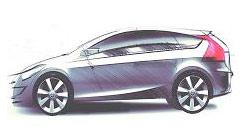Hyundai Motor Company plans to start retail sales of its first LPG–electric hybrid vehicle in July 2009. To be sold initially in the Korean domestic market under the Avante badge, the Elantra LPI Hybrid Electric Vehicle (HEV) is the world´s first hybrid vehicle to be powered by liquid petroleum gas (LPG) and the first to adopt advanced Lithium Polymer (Li–Poly) batteries.
Powered by a Liquefied Petroleum Injected (LPI) Gamma engine displacing 1.6 litres, a 15kW electric motor and a continuously variable transmission, the Elantra LPI HEV is a mild–type hybrid capable of delivering a competitive fuel economy rating.
"The Elantra LPI HEV demonstrates Hyundai´s innovative approach: We have leveraged Hyundai´s world leadership in LPG–fueled vehicles to develop a hybrid that will be very economical to operate," said Dr. Hyun–Soon Lee, president of the Research and Development Division.
Comparing operating costs among different types of hybrid vehicles currently available in the marketplace, the Elantra LPI HEV promises to be the cheapest of all to run. The Elantra LPI HEV promises to be as much as 40 percent cheaper to operate than other competitor models in the marketplace and 50 percent less than a conventional Elantra model powered by a gasoline–only engine. (Calculations are based on Korean domestic retail price of 1,907.08 KRW per liter of gasoline and LPG price of 1,828.65 KRW per kilogram as of the first week of June).
The Elantra LPI HEV will have a premium cost compared to a conventional Elantra due to the extra hardware (Li–Poly battery, DC motor and electrical control system). However, with the resulting fuel savings, Elantra LPI HEV buyers can expect to recover the extra cost of the vehicle in about two years.
In addition, the Elantra LPI HEV emits just 103g/km of CO2 and 90 percent fewer emissions than an equivalent standard gasoline–powered Elantra to qualify as a Super Ultra Low Emission Vehicle (SULEV).
The Elantra LPI HEV will be the first car in the world to use lithium polymer rechargeable batteries, which will be supplied solely by LG Chem*, one of the leading producers of the batteries. Li–poly batteries have significant advantages over lithium–ion batteries including higher energy density, lower manufacturing costs, being more robust to physical damage and they can also take more charge–discharge cycles before storage capacity begins to degrade.
Hyundai developed its very first hybrid electric vehicle in 1995 when it unveiled the Future Green Vehicle at the Seoul Motor Show. In 1999, it showed an Elantra HEV and in 2000, an Accent HEV, both of which featured hard–type parallel electric drive systems and integrated Starter Generator technology. However, these research development vehicles did not go into mass production.
In 2004, the company delivered 50 Getz gas–electric hybrid vehicles (B–segment vehicles badged as Hyundai Click in the Korean domestic market) to Korean government agencies as part of a fleet demonstration project. These were mild–type hybrid systems using 12kW motors and nickel metal hydride batteries. The hybrid technology development program continued to expand and in 2005, Hyundai and its affiliate Kia Motors Corp. delivered 350 more units to the demonstration fleet, 730 more units in 2006 and 1,682 more units in 2007, including Accent HEVs.
Current plants call for expanding the hybrid vehicle line–up to include mid–sized sedans in 2010.
Initial sales of the Elantra LPI HEV are to be restricted to the Korean domestic market. However, the LPI Hybrid could be exported to markets which are served by an excellent LPG distribution infrastructure.
As the Elantra LPI HEV remains under development, more detailed technical specifications will be released closer to the July 2009 launch date.

